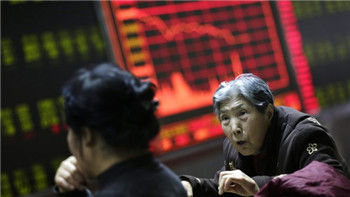
A shocking start to the year for China’s financial markets has resulted in the rest of Asia faring little better.
中國(guó)金融市場(chǎng)令人震驚的新年開(kāi)局嚴(yán)重拖累了亞洲其他市場(chǎng)。
Worldwide interest in China’s markets and economy is shining a spotlight on the region’s other markets as investors and analysts test links with mainland assets that in some cases are new and developing.
全球?qū)χ袊?guó)市場(chǎng)及經(jīng)濟(jì)的興趣,使亞洲其他市場(chǎng)也暴露在聚光燈下。投資者和分析師在測(cè)試一些資產(chǎn)與中國(guó)資產(chǎn)的關(guān)聯(lián);在某些情況下,這些關(guān)聯(lián)是新的、正在發(fā)展的。
Until recently, Asian markets tended to track closely the lead provided by Wall Street, even as local economies increased exposure to their vast neighbour. Now fears about China are weakening US stocks, and further weighing on Asia itself.
直到不久以前,亞洲各市場(chǎng)仍傾向于密切追隨華爾街的引領(lǐng),即便亞洲的經(jīng)濟(jì)體對(duì)鄰近的龐大經(jīng)濟(jì)體增加了敞口。如今,有關(guān)中國(guó)的擔(dān)心正在壓低美國(guó)股價(jià),進(jìn)而進(jìn)一步拖累亞洲當(dāng)?shù)氐氖袌?chǎng)。
“We’re in an environment where the market here is sensitive to slowing growth and downwardly revised expectations,” says Timothy Moe, chief Asia-Pacific equity strategist at Goldman Sachs.
“我們正處于這樣的環(huán)境:這里的市場(chǎng)對(duì)于經(jīng)濟(jì)增長(zhǎng)放緩和向下修正的預(yù)期十分敏感,”高盛(Goldman Sachs)亞太區(qū)首席股票策略師慕天輝(Timothy Moe)表示。
“Against that backdrop you’ve got fears about growth in China then being fanned by stocks falling and the renminbi depreciating.”
“在這個(gè)大背景下,你首先對(duì)中國(guó)經(jīng)濟(jì)增長(zhǎng)產(chǎn)生憂慮,然后被股價(jià)下跌和人民幣貶值搞得更加擔(dān)憂。”
There was no respite yesterday. Falls in Shanghai and Shenzhen took their losses so far this year to 15 per cent and 20 per cent, respectively.
昨日沒(méi)有出現(xiàn)讓人喘口氣的機(jī)會(huì)。上海和深圳股市延續(xù)跌勢(shì),使它們今年迄今的跌幅分別達(dá)到15%和20%。
Hong Kong’s Hang Seng is now down 9.2 per cent this year, Japan’s Topix is off 6.5 per cent and Taiwan’s Taiex has fallen 6.6 per cent. For the broader MSCI Asia-Pacific, 2016 ranks as the poorest start since 2000.
香港恒生指數(shù)(Hang Seng index)今年以來(lái)下跌9.2%,日本的東證指數(shù)(Topix)下跌6.5%,臺(tái)灣加權(quán)指數(shù)(Taiex)下跌6.6%。從覆蓋面更廣的MSCI明晟亞太指數(shù)(MSCI Asia-Pacific)看,2016年的新年開(kāi)局是自2000年以來(lái)最糟糕的。
Manishi Raychaudhuri, Asia equity strategist at BNP Paribas, says: “We knew we were living in difficult times but we didn’t imagine the risks would come home to roost so early in the year, and so brutally.”
法國(guó)巴黎銀行(BNP Paribas)亞洲股票策略師Manishi Raychaudhuri表示:“之前我們知道當(dāng)下是困難時(shí)期,但我們想不到風(fēng)險(xiǎn)會(huì)在進(jìn)入新的一年后這么快就爆發(fā),而且這么無(wú)情。”
Regional currencies have also suffered, with the Korean won falling 3.1 per cent against the dollar and the Malaysian ringgit 2.1 per cent weaker.
亞洲各國(guó)的貨幣也受到打擊,韓元兌美元匯率下跌3.1%,馬來(lái)西亞林吉特下跌2.1%。
The losses across asset classes have left investors scrambling to understand better how China actually interacts with its neighbours.
不同資產(chǎn)類別紛紛出現(xiàn)虧損,促使投資者紛紛想要更好地理解中國(guó)與鄰近的經(jīng)濟(jì)體之間存在怎樣的相互作用。
“There was a view for a lot of last year that the worst was behind us and that a Fed hike wasn’t to be feared given the significant adjustment we’d already had,” says Jonathan Garner, chief Asia and emerging markets equity strategist for Morgan Stanley. “But people are not as underweight as was thought.”
“去年很長(zhǎng)時(shí)間里曾有一種觀點(diǎn)認(rèn)為,我們已挺過(guò)最糟糕的時(shí)期,而且鑒于我們已經(jīng)遭遇的重大調(diào)整,美聯(lián)儲(chǔ)(Fed)加息沒(méi)什么可怕的,”摩根士丹利(Morgan Stanley)亞洲和新興市場(chǎng)首席股票策略師郭強(qiáng)盛(Jonathan Garner)表示。“但是,投資者(對(duì)亞洲股票)的持有比重沒(méi)有原來(lái)想象的那么低。”
Hong Kong has so far been the epicentre of reaction. Just yesterday, the short-term cost of borrowing offshore renminbi spiked sharply higher — thought to be largely a side-effect of China’s suspected intervention in the offshore market in the past week.
香港迄今是反應(yīng)的震中。就在昨日,借入離岸人民幣的短期成本出現(xiàn)飆升——據(jù)信這主要是中國(guó)在過(guò)去一周疑似干預(yù)離岸市場(chǎng)的一個(gè)副作用。
Offshore renminbi rates have limited real economic impact; however, analysts are also exploring more direct connections between the mainland and its offshore hub.
離岸人民幣利率對(duì)實(shí)體經(jīng)濟(jì)影響有限;不過(guò),分析師們也在探討內(nèi)地與離岸中心之間的更直接聯(lián)系。
The Morgan Stanley team, for example, calculates that every 1 per cent fall in the renminbi’s value against the dollar translates into a cut of a little more than 1 per cent in reported earnings for the Hong Kong China Enterprises index, the main measure of the Hong Kong shares of mainland companies.
比如,根據(jù)摩根士丹利團(tuán)隊(duì)的計(jì)算,人民幣相對(duì)于美元的幣值每下跌1%,就會(huì)轉(zhuǎn)換成恒生中國(guó)企業(yè)指數(shù)(HSCEI,在港上市內(nèi)地企業(yè)的主要股指)成份股報(bào)告的盈利減少逾1%。
With China’s markets still largely closed to outsiders, indices such as the HSCEI have become key proxies for China bets and feature in a range of products from futures to index-linked derivatives.
鑒于中國(guó)市場(chǎng)在很大程度上仍然不對(duì)外國(guó)人開(kāi)放,恒生中國(guó)企業(yè)指數(shù)之類的指數(shù)已成為押注中國(guó)的主要工具,用于各種產(chǎn)品——從期貨到指數(shù)掛鉤的衍生品。
Mohammed Apabhai, head of Asia-Pacific trading strategies at Citigroup, cautions that there is also the potential for particular products to move markets. So-called “autocallables”, index-related bets that offer an attractive yield unless the underlying market falls to a specified level, have proved popular in markets such as Korea. Many of these are based on the HSCEI.
花旗集團(tuán)(Citigroup)亞太區(qū)交易策略主管穆罕默德阿帕亥(Mohammed Apabhai)告誡稱,某些產(chǎn)品也有可能影響市場(chǎng)行情。所謂的“自動(dòng)贖回產(chǎn)品”(autocallables)——與指數(shù)關(guān)聯(lián)的押注,提供有吸引力的收益率,除非標(biāo)的市場(chǎng)跌至某個(gè)特定水平——迄今在韓國(guó)等市場(chǎng)被證明很受歡迎。此類產(chǎn)品中有很多基于恒生中國(guó)企業(yè)指數(shù)。
Mr Apabhai says: “You can imagine if the market is down 5 or 6 per cent in a day then suddenly there is some futures selling that emerges, that is going to have a pretty big impact.
阿帕亥表示:“你可以想象,如果市場(chǎng)在一天里下跌5%或6%,然后突然出現(xiàn)一些期貨拋售,那將產(chǎn)生相當(dāng)大的影響。
“If you woke up tomorrow and you saw the HSCEI down 12 per cent [and] if you didn’t know about these products what you’d automatically imagine is that this is it; this is the big China credit crisis that everybody’s been waiting for, when actually it may be nothing of the sort and it may just be a technical selling.”
“如果你明日早上醒來(lái),看到恒生中國(guó)企業(yè)指數(shù)下跌12%,如果你不知道有這些產(chǎn)品存在,你會(huì)自動(dòng)想到這就是了,這就是人人預(yù)期會(huì)爆發(fā)的中國(guó)信貸大危機(jī),而實(shí)際上它可能根本不是那么回事,而只是技術(shù)性賣盤(pán)。”











